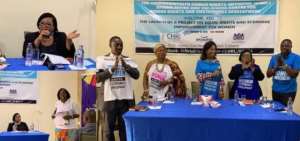
A project that seeks to increase the knowledge and awareness of the rights of women in rural communities and empower them with economically sustainable livelihood vocation has been inaugurated in Accra.
The three-year project, dubbed Protection of Equal Rights and Economic for Women (PEREEW), would, among other goals, intensify the level of consciousness of roles of the agencies set up to protect and prevent discriminations against women.
Funded by the Kingdom of the Netherlands, PEREEW would be jointly implemented by the Commonwealth Human Rights Initiative (CHRI) and Africa Centre for Human Rights and Sustainable Development (AfCHuRSD) at communities in Accra, Kumasi, Tamale.
Ms Bernice Naah, the Chief Executive Officer of (AfCHuRSD), said at the launch that the comprehensive strategies designed by the project would deliver results to complement government efforts at achieving the Sustainable Development Goals (SDG), especially Goal Five, which focused on gender equity and empowerment of all women and girls.
She explained that preliminary studies conducted in the project areas revealed the resistance women in urban areas face in entering into non-traditional fields after managing to obtain the necessary skills and training.
The survey, Ms Naah said, showed that the majority of women were still under-represented at the local levels and also did not have much say in decisions that affected their wellbeing.
Dr Reverend Comfort Asare, a Director at the Department of the Ministry of Gender, Children and Social Protection, said gender equality was a basic human right issue that formed the centrality of the SDGs.
She said women must be empowered to enable them to support themselves, the nuclear family and society as a whole.
'Women need to know their rights and understand them in order to discover themselves because they have great talents and are capable to turn the fortunes around,' she said.
To bridge the under-representation of women at leadership positions, she stated that the Government had initiated projects to encourage women to contest in the upcoming District Assembly elections.
Dr Juliette Tuakli, the Chief Executive Officer of Family Child and Associates, a Non-Governmental Organisation, stated that 19 per cent of women who were able to break barriers and occupy leadership positions received mentorship support from their fathers.
She said women possessed unique gifts, which when given the needed push, could help bridge the poverty gap.
Dr Tuakli called on Ghana to improve on the education of women just as is done in other African countries like Rwanda and Kenya.
Madam Mina Mensah, the Country Director of (CHRI), acknowledged that some initiatives had earlier been implemented by government and non-governmental organisations but more work needed to be done to increase the number of women in leadership positions to facilitate development.
She urged media houses to create a balance for a new narrative on the SDGs relating to women empowerment to bring new hope towards enhancing transformational change.
—GNA




 Former Kotoko Player George Asare elected SRC President at PUG Law Faculty
Former Kotoko Player George Asare elected SRC President at PUG Law Faculty
 2024 elections: Consider ‘dumsor’ when casting your votes; NPP deserves less — P...
2024 elections: Consider ‘dumsor’ when casting your votes; NPP deserves less — P...
 You have no grounds to call Mahama incompetent; you’ve failed — Prof. Marfo blas...
You have no grounds to call Mahama incompetent; you’ve failed — Prof. Marfo blas...
 2024 elections: NPP creates better policies for people like us; we’ll vote for B...
2024 elections: NPP creates better policies for people like us; we’ll vote for B...
 Don’t exchange your life for wealth; a sparkle of fire can be your end — Gender ...
Don’t exchange your life for wealth; a sparkle of fire can be your end — Gender ...
 Ghana’s newly installed Poland train reportedly involved in accident while on a ...
Ghana’s newly installed Poland train reportedly involved in accident while on a ...
 Chieftaincy disputes: Government imposes 4pm to 7am curfew on Sampa township
Chieftaincy disputes: Government imposes 4pm to 7am curfew on Sampa township
 Franklin Cudjoe fumes at unaccountable wasteful executive living large at the ex...
Franklin Cudjoe fumes at unaccountable wasteful executive living large at the ex...
 I'll 'stoop too low' for votes; I'm never moved by your propaganda — Oquaye Jnr ...
I'll 'stoop too low' for votes; I'm never moved by your propaganda — Oquaye Jnr ...
 Kumasi Thermal Plant commissioning: I pray God opens the eyes of leaders who don...
Kumasi Thermal Plant commissioning: I pray God opens the eyes of leaders who don...
